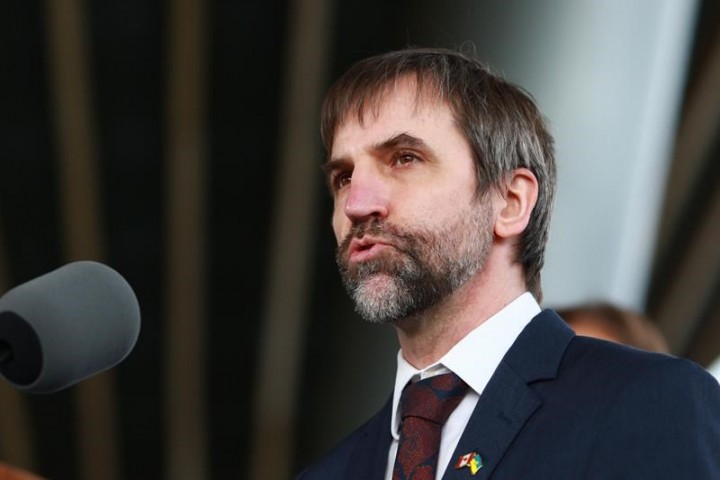ST. JOHN’S, N.L. — Federal Environment Minister Steven Guilbeault has approved a controversial new oil project off the coast of Newfoundland with what Ottawa is calling the strongest emissions rules ever imposed.
His decision released Wednesday by the Impact Assessment Agency of Canada says Equinor’s Bay du Nord project can proceed as long it achieves net-zero greenhouse gas emissions by 2050.
That means the company will have to offset or capture any emissions the project produces by 2050. The announcement says this is the first time the federal government has imposed such a condition on an energy project.
Until 2050, Equinor is also legally required to consider and incorporate the best available options for reducing emissions.
“I have determined that the designated project is not likely to cause significant adverse environmental effects,” Guilbeault said in the 22-page decision statement.
But the former environmental activist who used to lobby against oil and gas projects in his life before politics said the decision kept him up at night.
“It’s one of the hardest decisions I’ve ever had to make,” Guilbeault said in an interview.
But he said the government established a new environmental review process for such projects and created the Impact Assessment Agency of Canada to do it, with an aim of taking the politics out of the process.
This project was reviewed using the previous system because of when the application was received, but Guilbeault said going against the recommendation of an independent agency was not something he could do.
“They made a recommendation to me that they, after studying the project for four years, with 137 conditions, including the project be net zero by 2050, their conclusion was that the project could have no significant impact,” he said. “So that was a challenge for me to go against this institution.”
Bay du Nord is expected to produce around 300 million barrels of oil over its lifetime, though industry insiders in Newfoundland and Labrador say that figure could be more than 800 million barrels. Equinor has said Bay du Nord would likely start pumping in the latter half of the decade, and continue producing for 20 to 30 years. Production is expected to peak at around 200,000 barrels a day.
Greenhouse gas emissions from production are anticipated to be as low as eight kilograms per barrel. The average emissions from oil production in Canada is 40 kilograms per barrel, and in the oilsands, it’s 80 kilograms.
Equinor predicts annual emissions from the project will be between 177,770 and 257,715 tonnes.
But climate scientists and environmentalists have opposed the project, saying it would undermine Canada’s goals for reducing greenhouse gas emissions, and say the emissions from production ignore how many greenhouse gas emissions will be produced when the fossil fuels are burned.
The government signalled Wednesday that the conditions being put on Bay du Nord, including net-zero by 2050, will become the legal standard for any future oil and gas project seeking federal approval.
Guilbeault said oil consumption is going to drop by 2050 but there will still be some demand, and it will only be for oil that is carbon neutral. He said projects like this one, which have a carbon footprint compatible with addressing climate change, are going to ultimately displace oil production that do not.
“Well, that’s what we have to do,” he said. “I mean, unless those other productions find ways to to be carbon neutral, that’s the inevitable conclusion that the world is coming to.”
Equinor spokesman Alex Collins said the Bay du Nord project “has the potential to produce the lowest-carbon oil in the country.”
“Equinor is pleased with the strong support that the Bay du Nord project has received from stakeholders across the province and Canada,” she said.
Collins noted in an earlier statement the company and its partners haven’t yet sanctioned the development. That decision, she said, is expected “in the next couple years.” Equinor has said the project will provide about $3.5 billion in total revenues for the cash-strapped government of Newfoundland and Labrador.
Premier Andrew Furey was beaming at an evening news conference, saying the project will be an economic driver for his province. He said greenhouse gas emissions from the project will be among the lowest in the world for an oil project and it will help meet global demand for “low-carbon, ethical oil.”
“This will be a giant step forward in our economic recovery,” Furey added.
Climate activists were not pleased.
“(The) decision represents a triumph of the kind of politics that will only deepen the climate crisis and global addiction to planet-wrecking fossil fuels,” Keith Stewart, senior energy strategist at Greenpeace Canada, said in an emailed statement.
“This decision isn’t just a climate failure, it is a failure to imagine and invest in a sustainable energy future for the Atlantic region.”
Caroline Brouillette, national policy manager at Climate Action Network Canada, said progress on climate over the last few years is being undermined by this approval.
“Frankly I think this is heartbreaking,” she said.
Brouillette said it’s coming just two days after a United Nations climate report that was clear there is no room for more oil and gas production if the world is to avoid the worst of the climate crisis.
“It’s so clearly not compatible with climate safety,” she said.
This report by The Canadian Press was first published April 6, 2022.
Sarah Smellie and Mia Rabson, The Canadian Press
Related


































